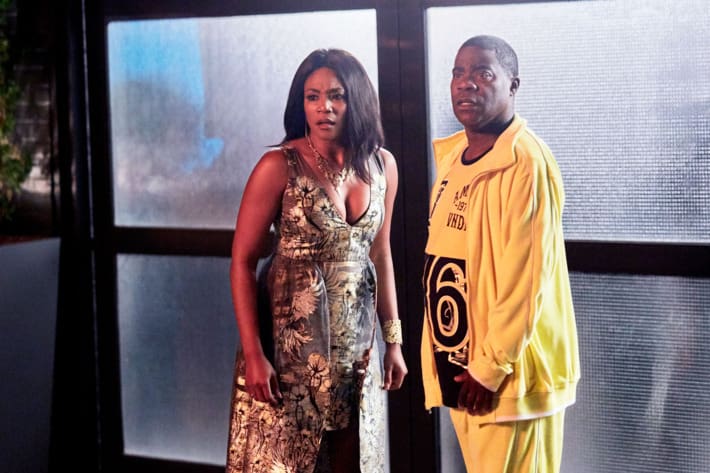
Tracy Morgan is back! After suffering a near-fatal bus crash in 2014, Morgan is making a return to TV. Just don’t expect a return as Tracy Jordan, his lovable and transcendentally insightful role on 30 Rock. Morgan is back to make a statement with The Last O.G. (for those not familiar, O.G. means Original Gangster). He brings the unfiltered truth to the table with series co-creator Jordan Peele, using stories from his life before fame to explore an evolving world.
Though the series is set around a black neighborhood, don’t think it’s just about the black experience. There is something for everyone to relate to.
During a Q&A following a sneak peek of the first two episodes before the TBS series premiere on April 3, Morgan was asked his thoughts about speaking as a black man today. Morgan’s responded that he speaks as a human, not simply a black man. That easily comes across through the first couple of episodes.
After serving 15 years in prison for covering for another dealer (and never snitching in prison), Tray has turned his focus from slinging on the street to guiding others from the same path that led him behind bars. But everything has changed. The first people he goes to with advice aren’t gangsters like he thought, but two guys excited for brunch. Tray’s whole neighborhood has been gentrified. Most drastic though, his girlfriend Shay (Tiffany Haddish) is married to a white businessman, has a successful business, goes by Shannon, and has two kids Tray soon figures out are his but can’t meet until he lands a job.
Naturally, in his state of reinvention, Tray begins his search for work. As the preeminent cook in prison, he demands to be hired at one of the city’s top spot’s head chef. When he’s rejected however good his “dessert loaf” is, he grovels for any position without success. He ends up being hired as a barista, a hilarious epitome of gentrification which Tray tries to take back contrasted with a hyper-woke manager who nicely complements Tray’s fish-out-water story.
The Last O.G. is at its strongest when Morgan is allowed to dig deeper into his neighborhood. There’s a place for quick laughs putting Tray in odd misunderstandings and putting his eccentricity on display — there was plenty of that on 30 Rock. But the greatest moments of the show’s run so far is its more endearing moments, touching on wider issues than Tray’s shocking abilities as a cook.
Circling back to Morgan saying he speaks as a human, not just a black man, he certainly walks that line well. Though Tray moves into a halfway house that’s run by Mullins (Cedric the Entertainer) and is occupied by even more former black cons, they aren’t the sole group. Even if they were, the focus is placed more on the struggles as an ex-con and how difficult it is to accept the world and for the world to accept outcasts in return — again, relating to gentrification.
Through the first episodes, the politics have been nice brand strokes but there’s promise of more timely and precise topics up for discussion. The challenge will be to keep Tray’s battle to be the gangster that actually turns his life around and help others avoid his path, unlike the dozens that Mullins laughs about seeing them fail after prison.
These are all heavy topics and seem worthy of being in an hour-long network drama. But the comedy actually helps accentuate the issues, and with talent like Haddish and Morgan playing off each other, it’s gone off without a hitch so far. Haddish, most known for her hilarious and charismatic turn in Girls Trip last summer is given a new platform to elevate her game. However funny she in that type of role, she’s not bound to being the outgoing, raunchy, scene-stealer.
Based on a flashback scene before Tray went to prison, it could be assumed Shay used to be that Girls Trip-type character but Haddish does a remarkable job settling into a new character that Tray has to learn to mirror.
For the 30 Rock fans wanting more Tracy Jordan, you’ll be mostly disappointed. But the show does a good job of explaining why that character has to retire. This is a new era, and all of our surroundings are changing, so should our characters and how we interpret what’s going on beyond our bubble.
Overall Grade: 7.5 out of 10

